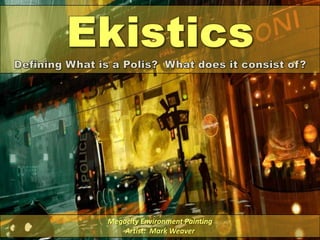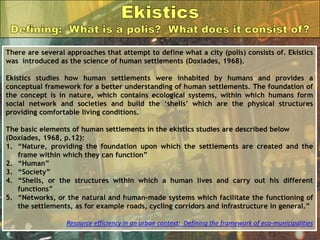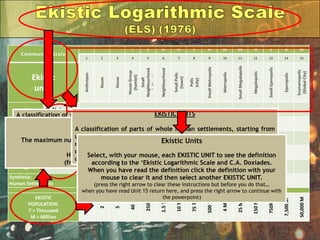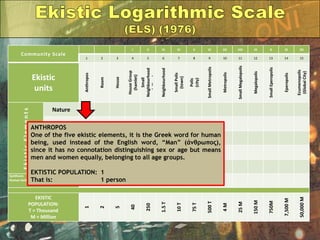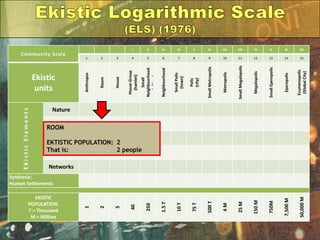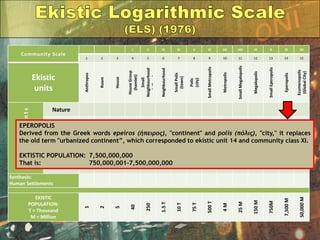Ekistics - Defining What is a Polis? What does it consist of
- 1. Megacity Environment Painting Artist: Mark Weaver
- 2. There are several approaches that attempt to define what a city (polis) consists of. Ekistics was introduced as the science of human settlements (Doxiades, 1968). Ekistics studies how human settlements were inhabited by humans and provides a conceptual framework for a better understanding of human settlements. The foundation of the concept is in nature, which contains ecological systems, within which humans form social network and societies and build the „shells‟ which are the physical structures providing comfortable living conditions. The basic elements of human settlements in the ekistics studies are described below (Doxiades, 1968, p.12): 1. “Nature, providing the foundation upon which the settlements are created and the frame within which they can function” 2. “Human” 3. “Society” 4. “Shells, or the structures within which a human lives and carry out his different functions” 5. “Networks, or the natural and human-made systems which facilitate the functioning of the settlements, as for example roads, cycling corridors and infrastructure in general.” Resource efficiency in an urban context: Defining the framework of eco-municipalities
- 3. Community Scale I II III IV V VI VII VIII IX X XI XII 1 2 3 4 5 6 7 8 9 10 11 12 13 14 15 Ekistic units Anthropos Room House HouseGroup (hamlet) Small Neighbourhood (village) Neighbourhood SmallPolis (town) Polis (city) SmallMetropolis Metropolis SmallMegalopolis Megalopolis SmallEperopolis Eperopolis Ecumenopolis (GlobalCity) EkisticElements Nature Anthropos Society Shells Networks Synthesis: Human Settlements EKISTIC POPULATION: T = Thousand M = Million 1 2 5 40 250 1.5T 10T 75T 500T 4M 25M 150M 750M 7,500M 50,000M EKISTIC ELEMENTS The 5 elements, which compose the human settlements: Nature, Anthropos (Man), Society, Shells and Networks. A classification of settlements according to their size, presented on the basis of a logarithmic scale, running from Anthropos (ekistic unit 1), as the smallest unit of measurement, to the whole earth (ekistic unit 15). The ekistic logarithmic scale can be presented graphically, showing area or number of people corresponding to each unit, etc., so that it can be used as a basis for the measurement and classification of many dimensions in human settlements. EKISTIC POPULATION The maximum number of people for each of the Ekistic units. ie House Group: 40 people max. (from: 6-40 is a „House Group‟) EKISTIC UNITS A classification of parts of whole human settlements, starting from unit 1 corresponding to Anthropos, and ending with unit 15, corresponding to Ecumenopolis. From unit 4, which corresponds to community class I, to unit 15, which corresponds to community class XII. Ekistic Units Select, with your mouse, each EKISTIC UNIT to see the definition according to the „Ekistic Logarithmic Scale and C.A. Doxiades. When you have read the definition click the definition with your mouse to clear it and then select another EKISTIC UNIT. (press the right arrow to clear these instructions but before you do that… when you have read Unit 15 return here, and press the right arrow to continue with the powerpoint)
- 4. Community Scale I II III IV V VI VII VIII IX X XI XII 1 2 3 4 5 6 7 8 9 10 11 12 13 14 15 Ekistic units Anthropos Room House HouseGroup (hamlet) Small Neighbourhood (village) Neighbourhood SmallPolis (town) Polis (city) SmallMetropolis Metropolis SmallMegalopolis Megalopolis SmallEperopolis Eperopolis Ecumenopolis (GlobalCity) EkisticElements Nature Anthropos Society Shells Networks Synthesis: Human Settlements EKISTIC POPULATION: T = Thousand M = Million 1 2 5 40 250 1.5T 10T 75T 500T 4M 25M 150M 750M 7,500M 50,000M ANTHROPOS One of the five ekistic elements, it is the Greek word for human being, used instead of the English word, “Man” (άμθρωπος), since it has no connotation distinguishing sex or age but means men and women equally, belonging to all age groups. EKTISTIC POPULATION: 1 That is: 1 person
- 5. Community Scale I II III IV V VI VII VIII IX X XI XII 1 2 3 4 5 6 7 8 9 10 11 12 13 14 15 Ekistic units Anthropos Room House HouseGroup (hamlet) Small Neighbourhood (village) Neighbourhood SmallPolis (town) Polis (city) SmallMetropolis Metropolis SmallMegalopolis Megalopolis SmallEperopolis Eperopolis Ecumenopolis (GlobalCity) EkisticElements Nature Anthropos Society Shells Networks Synthesis: Human Settlements EKISTIC POPULATION: T = Thousand M = Million 1 2 5 40 250 1.5T 10T 75T 500T 4M 25M 150M 750M 7,500M 50,000M ROOM EKTISTIC POPULATION: 2 That is: 2 people
- 6. Community Scale I II III IV V VI VII VIII IX X XI XII 1 2 3 4 5 6 7 8 9 10 11 12 13 14 15 Ekistic units Anthropos Room House HouseGroup (hamlet) Small Neighbourhood (village) Neighbourhood SmallPolis (town) Polis (city) SmallMetropolis Metropolis SmallMegalopolis Megalopolis SmallEperopolis Eperopolis Ecumenopolis (GlobalCity) EkisticElements Nature Anthropos Society Shells Networks Synthesis: Human Settlements EKISTIC POPULATION: T = Thousand M = Million 1 2 5 40 250 1.5T 10T 75T 500T 4M 25M 150M 750M 7,500M 50,000M HOUSE This term replaces „dwelling‟. EKTISTIC POPULATION: 5 That is: 3-5 people
- 7. Community Scale I II III IV V VI VII VIII IX X XI XII 1 2 3 4 5 6 7 8 9 10 11 12 13 14 15 Ekistic units Anthropos Room House HouseGroup (hamlet) Small Neighbourhood (village) Neighbourhood SmallPolis (town) Polis (city) SmallMetropolis Metropolis SmallMegalopolis Megalopolis SmallEperopolis Eperopolis Ecumenopolis (GlobalCity) EkisticElements Nature Anthropos Society Shells Networks Synthesis: Human Settlements EKISTIC POPULATION: T = Thousand M = Million 1 2 5 40 250 1.5T 10T 75T 500T 4M 25M 150M 750M 7,500M 50,000M HOUSE GROUP This replaces „dwelling group‟. Also known as: Hamlet: A small settlement, generally one smaller than a village; also known as a thorp. EKTISTIC POPULATION: 40 That is: 6-40 people
- 8. Community Scale I II III IV V VI VII VIII IX X XI XII 1 2 3 4 5 6 7 8 9 10 11 12 13 14 15 Ekistic units Anthropos Room House HouseGroup (hamlet) Small Neighbourhood (village) Neighbourhood SmallPolis (town) Polis (city) SmallMetropolis Metropolis SmallMegalopolis Megalopolis SmallEperopolis Eperopolis Ecumenopolis (GlobalCity) EkisticElements Nature Anthropos Society Shells Networks Synthesis: Human Settlements EKISTIC POPULATION: T = Thousand M = Million 1 2 5 40 250 1.5T 10T 75T 500T 4M 25M 150M 750M 7,500M 50,000M SMALL NEIGHBOURHOOD NEIGHBOURHOOD A district, esp. one forming a community within a town or city. Also known as a: Village: A group of houses and associated buildings, larger than a hamlet and smaller than a town, situated in a rural area. EKTISTIC POPULATION: 250 That is: 41-250 people
- 9. Community Scale I II III IV V VI VII VIII IX X XI XII 1 2 3 4 5 6 7 8 9 10 11 12 13 14 15 Ekistic units Anthropos Room House HouseGroup (hamlet) Small Neighbourhood (village) Neighbourhood SmallPolis (town) Polis (city) SmallMetropolis Metropolis SmallMegalopolis Megalopolis SmallEperopolis Eperopolis Ecumenopolis (GlobalCity) EkisticElements Nature Anthropos Society Shells Networks Synthesis: Human Settlements EKISTIC POPULATION: T = Thousand M = Million 1 2 5 40 250 1.5T 10T 75T 500T 4M 25M 150M 750M 7,500M 50,000M NEIGHBOURHOOD A district, esp. one forming a community within a town or city. EKTISTIC POPULATION: 1,500 That is: 251-1,500 people
- 10. Community Scale I II III IV V VI VII VIII IX X XI XII 1 2 3 4 5 6 7 8 9 10 11 12 13 14 15 Ekistic units Anthropos Room House HouseGroup (hamlet) Small Neighbourhood (village) Neighbourhood SmallPolis (town) Polis (city) SmallMetropolis Metropolis SmallMegalopolis Megalopolis SmallEperopolis Eperopolis Ecumenopolis (GlobalCity) EkisticElements Nature Anthropos Society Shells Networks Synthesis: Human Settlements EKISTIC POPULATION: T = Thousand M = Million 1 2 5 40 250 1.5T 10T 75T 500T 4M 25M 150M 750M 7,500M 50,000M SMALL POLIS POLIS A city-state in ancient Greece. A City. Etymology: "ancient Greek city-state," 1894, from Greek polis (πόλις) "city, one's city; the state, citizens," from PIE *pele- "citadel, enclosed space, often on high ground" (cf. Sanskrit pur,puram "city, citadel," Lithuanian pilis "fortress"). Online Etymology Dictionary: Polis Also known as a: Town: An urban area that has a name, defined boundaries, and local government, and that is larger than a village but smaller than a city. EKTISTIC POPULATION: 10,000 That is: 1,501-10,000 people
- 11. Community Scale I II III IV V VI VII VIII IX X XI XII 1 2 3 4 5 6 7 8 9 10 11 12 13 14 15 Ekistic units Anthropos Room House HouseGroup (hamlet) Small Neighbourhood (village) Neighbourhood SmallPolis (town) Polis (city) SmallMetropolis Metropolis SmallMegalopolis Megalopolis SmallEperopolis Eperopolis Ecumenopolis (GlobalCity) EkisticElements Nature Anthropos Society Shells Networks Synthesis: Human Settlements EKISTIC POPULATION: T = Thousand M = Million 1 2 5 40 250 1.5T 10T 75T 500T 4M 25M 150M 750M 7,500M 50,000M POLIS A city-state in ancient Greece. A City. Etymology: "ancient Greek city-state," 1894, from Greek polis (πόλις) "city, one's city; the state, citizens," from PIE *pele- "citadel, enclosed space, often on high ground" (cf. Sanskrit pur, puram "city, citadel," Lithuanian pilis "fortress"). Online Etymology Dictionary: Polis Also known as a: City: A large town. EKTISTIC POPULATION: 75,000 That is: 10,001-75,000 people
- 12. Community Scale I II III IV V VI VII VIII IX X XI XII 1 2 3 4 5 6 7 8 9 10 11 12 13 14 15 Ekistic units Anthropos Room House HouseGroup (hamlet) Small Neighbourhood (village) Neighbourhood SmallPolis (town) Polis (city) SmallMetropolis Metropolis SmallMegalopolis Megalopolis SmallEperopolis Eperopolis Ecumenopolis (GlobalCity) EkisticElements Nature Anthropos Society Shells Networks Synthesis: Human Settlements EKISTIC POPULATION: T = Thousand M = Million 1 2 5 40 250 1.5T 10T 75T 500T 4M 25M 150M 750M 7,500M 50,000M SMALL METROPOLIS Metropolis: A major, multi-centre urban area with more than 50,000 people incorporating other small settlements, both urban and rural, growing dynamically to sizes as high as ten million people. The average population of such settlements between 50,000 and ten million inhabitants is of the order of 2.5 million, while about one half of these settlements have a population varying between 50,000 and 100,000. (μητρόπολη) Glossary DOXIADES: Metropolis EKTISTIC POPULATION: 500,000 That is: 75,001-500,000
- 13. Community Scale I II III IV V VI VII VIII IX X XI XII 1 2 3 4 5 6 7 8 9 10 11 12 13 14 15 Ekistic units Anthropos Room House HouseGroup (hamlet) Small Neighbourhood (village) Neighbourhood SmallPolis (town) Polis (city) SmallMetropolis Metropolis SmallMegalopolis Megalopolis SmallEperopolis Eperopolis Ecumenopolis (GlobalCity) EkisticElements Nature Anthropos Society Shells Networks Synthesis: Human Settlements EKISTIC POPULATION: T = Thousand M = Million 1 2 5 40 250 1.5T 10T 75T 500T 4M 25M 150M 750M 7,500M 50,000M METROPOLIS Etymology: • From Greek metropolis "mother city" (μητρόπολις) (from which others have been colonized), also "capital city," from meter (μήτηρ) "mother" + polis (πόλις) "city" – (parent state of a colony) • Meaning "chief town or capital city of a province" is first attested 1580s, earlier metropol (late 14c.). • "seat of a metropolitan bishop," 1530s, from Late Latin metropolis. Online Etymology Dictionary: Metropolis EKTISTIC POPULATION: 4,000,000 That is: 501,000-4,000,000
- 14. Community Scale I II III IV V VI VII VIII IX X XI XII 1 2 3 4 5 6 7 8 9 10 11 12 13 14 15 Ekistic units Anthropos Room House HouseGroup (hamlet) Small Neighbourhood (village) Neighbourhood SmallPolis (town) Polis (city) SmallMetropolis Metropolis SmallMegalopolis Megalopolis SmallEperopolis Eperopolis Ecumenopolis (GlobalCity) EkisticElements Nature Anthropos Society Shells Networks Synthesis: Human Settlements EKISTIC POPULATION: T = Thousand M = Million 1 2 5 40 250 1.5T 10T 75T 500T 4M 25M 150M 750M 7,500M 50,000M SMALL MEGALOPOLIS MEGALOPOLIS Also known as a: Megapolis (Μεγάπολις) or Megaregion is typically defined as a chain of roughly adjacent metropolitan areas, built by merging several cities and their suburbs. EKTISTIC POPULATION: 25,000,000 That is: 4,000,001-25,000,000
- 15. Community Scale I II III IV V VI VII VIII IX X XI XII 1 2 3 4 5 6 7 8 9 10 11 12 13 14 15 Ekistic units Anthropos Room House HouseGroup (hamlet) Small Neighbourhood (village) Neighbourhood SmallPolis (town) Polis (city) SmallMetropolis Metropolis SmallMegalopolis Megalopolis SmallEperopolis Eperopolis Ecumenopolis (GlobalCity) EkisticElements Nature Anthropos Society Shells Networks Synthesis: Human Settlements EKISTIC POPULATION: T = Thousand M = Million 1 2 5 40 250 1.5T 10T 75T 500T 4M 25M 150M 750M 7,500M 50,000M MEGALOPOLIS A very large, heavily populated city or urban complex. (Μεγαλόπολις) Also known as a: Megapolis (Μεγάπολις) or Megaregion is typically defined as a chain of roughly adjacent metropolitan areas, built by merging several cities and their suburbs. Etymology: 1832 from combination form of Greek MEGAS (Μέγας) (genitive megalou «μεγάλου») “great” + POLIS (πόλις) “city”. The word was used in classical times as an epithet (descriptive word; adjective used as noun) of great cities (Athens, Syracuse, Alexandria), and it also was the name of a former city in Arcadia. EKTISTIC POPULATION: 150,000,000 That is: 25,000,001-150,000,000
- 16. Community Scale I II III IV V VI VII VIII IX X XI XII 1 2 3 4 5 6 7 8 9 10 11 12 13 14 15 Ekistic units Anthropos Room House HouseGroup (hamlet) Small Neighbourhood (village) Neighbourhood SmallPolis (town) Polis (city) SmallMetropolis Metropolis SmallMegalopolis Megalopolis SmallEperopolis Eperopolis Ecumenopolis (GlobalCity) EkisticElements Nature Anthropos Society Shells Networks Synthesis: Human Settlements EKISTIC POPULATION: T = Thousand M = Million 1 2 5 40 250 1.5T 10T 75T 500T 4M 25M 150M 750M 7,500M 50,000M SMALL EPEROPOLIS EPEROPOLIS (ηπειρόπολις) Derived from the Greek words epeiros (ήπειρος), "continent" and polis (πόλις), "city," it replaces the old term "urbanized continent”, which corresponded to ekistic unit 14 and community class XI. EKTISTIC POPULATION: 750,000,000 That is: 150,000,001-750,000,000
- 17. Community Scale I II III IV V VI VII VIII IX X XI XII 1 2 3 4 5 6 7 8 9 10 11 12 13 14 15 Ekistic units Anthropos Room House HouseGroup (hamlet) Small Neighbourhood (village) Neighbourhood SmallPolis (town) Polis (city) SmallMetropolis Metropolis SmallMegalopolis Megalopolis SmallEperopolis Eperopolis Ecumenopolis (GlobalCity) EkisticElements Nature Anthropos Society Shells Networks Synthesis: Human Settlements EKISTIC POPULATION: T = Thousand M = Million 1 2 5 40 250 1.5T 10T 75T 500T 4M 25M 150M 750M 7,500M 50,000M EPEROPOLIS Derived from the Greek words epeiros (ήπειρος), "continent" and polis (πόλις), "city," it replaces the old term "urbanized continent”, which corresponded to ekistic unit 14 and community class XI. EKTISTIC POPULATION: 7,500,000,000 That is: 750,000,001-7,500,000,000
- 18. Community Scale I II III IV V VI VII VIII IX X XI XII 1 2 3 4 5 6 7 8 9 10 11 12 13 14 15 Ekistic units Anthropos Room House HouseGroup (hamlet) Small Neighbourhood (village) Neighbourhood SmallPolis (town) Polis (city) SmallMetropolis Metropolis SmallMegalopolis Megalopolis SmallEperopolis Eperopolis Ecumenopolis (GlobalCity) EkisticElements Nature Anthropos Society Shells Networks Synthesis: Human Settlements EKISTIC POPULATION: T = Thousand M = Million 1 2 5 40 250 1.5T 10T 75T 500T 4M 25M 150M 750M 7,500M 50,000M ECUMENOPOLIS Ecumenopolis (from Greek: οικουμέμη, meaning world, and πόλις (polis) meaning city, thus a city made of the whole world; pl. ecumenopolises or ecumenopoleis) is a word invented in 1967 by the Greek city planner Constantinos Doxiadis to represent the idea that in the future urban areas and megalopolises would eventually fuse and there would be a single continuous worldwide city as a progression from the current urbanization and population growth trends. Academic Dictionaries and Encyclopedias: Ecumenopolis Also known as: Global City, Planet City, Universal City, City of the Universe, City of the Future EKTISTIC POPULATION: 50,000,000,000 That is: 7,500,000,001-50,000,000,000

